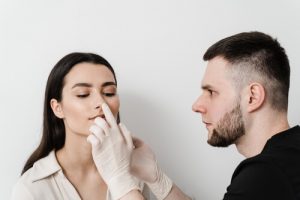Many individuals grappling with severe acne turn to Accutane, a powerful medication renowned for its effectiveness. However, amidst its benefits, some users speculate about unexpected changes in their physical appearance, particularly regarding nasal size. Does Accutane shrink your nose? This intriguing question taps into broader discussions about the side effects associated with this treatment. Stay tuned as we uncover the facts behind this potent acne solution and its effects on the nose.
Does Accutane Shrink Your Nose?
No, Accutane does not shrink your nose. Accutane, or isotretinoin, is primarily prescribed for severe acne because it decreases oil production and skin inflammation. Although it may lead to side effects like dryness in the nasal passages, there is no proof that Accutane causes any structural changes to the nose or leads to its shrinkage. Any perceived change in the size or shape of the nose is likely due to reductions in skin oiliness or changes in skin texture rather than any actual modification of nasal cartilage or bone structure.
Understanding Accutane and Its Primary Uses
Accutane, scientifically known as isotretinoin, is a highly effective treatment primarily used for severe acne that has not responded well to other treatments. This powerful medication functions by dramatically reducing the size of the skin’s oil glands, which decreases oil production, limits bacterial growth, and reduces inflammation.
- Reduction of Sebum Production: Accutane targets sebaceous glands, decreasing sebum production and helping to clear up severe cases of acne.
- Impact on Skin Pores: By reducing the oil secretion, Accutane also helps to unclog pores and prevent the formation of new acne lesions.
- Long-term Acne Relief: Clinical research supports Accutane’s ability to provide long-term remission of acne symptoms after just one treatment, making it a significant option for those with persistent acne.
- Usage and Supervision: Due to its potent nature and range of potential side effects, including the risk of congenital disabilities, Accutane must be prescribed and monitored by a board-certified dermatologist.
Exploring the Myth: Does Accutane Affect Nasal Tissue?
 Analysis of Accutane’s Effects on Nasal Tissue:
Analysis of Accutane’s Effects on Nasal Tissue:
- Potential Side Effects: While Accutane is known for its dramatic effects on the skin, it can also cause dryness in mucous membranes, including those inside the nose. This can lead to dryness, irritation, and, in some cases, nosebleeds. However, these symptoms do not indicate structural changes or permanent alterations to nasal tissues.
- Clinical Studies and Reports: There is no substantial clinical evidence to suggest that Accutane directly alters nasal cartilage or the underlying structure of the nose. Some users may perceive changes in the nose’s appearance as related to general changes in skin texture and fat loss, which can slightly alter the appearance of facial features rather than actual structural changes.
Mechanism of Action: How Accutane Works on the Body
Understanding how Accutane works within the body can help patients understand why it’s often reserved for more challenging cases of acne and the considerations involved in its use as a cosmetic.
Mechanism of Action of Accutane:
- Reduction of Sebaceous Glands: Accutane primarily works by dramatically reducing the size and output of the sebaceous glands, which are responsible for producing skin oil (sebum). By decreasing sebum production, Accutane effectively reduces one of the key contributors to acne formation.
- Prevention of Cellular Buildup: Accutane aids in normalising the shedding of dead skin cells that can block pores, thereby decreasing the formation of comedones, such as blackheads and whiteheads. This action helps keep the pores clear of blockages that can lead to more severe forms of acne.
- Anti-inflammatory Properties: Accutane possesses potent anti-inflammatory properties. Acne is fundamentally an inflammatory disease, and by reducing inflammation, isotretinoin can decrease the redness and swelling associated with severe acne lesions.
Systemic Effects:
- Impact on the Whole Body: Isotretinoin is a systemic retinoid affecting the entire body. This is why it’s so effective in treating acne but can cause various side effects. It influences cell growth and differentiation, immune function, and inflammation throughout the body, not just in the skin.
- Vitamin A Derivative: Structurally similar to vitamin A, isotretinoin works by mimicking the effects of this essential nutrient in regulating cell growth and turnover. However, unlike regular vitamin A intake, the concentrated and targeted action of isotretinoin provides a much more powerful and immediate effect.
Addressing Concerns: What to Expect While on Accutane and How to Manage Side Effects
 Taking Accutane (isotretinoin) for severe acne can lead to notable side effects, and the patient’s understanding of how to manage them is crucial for a comfortable treatment experience. Here are key expectations and management strategies:
Taking Accutane (isotretinoin) for severe acne can lead to notable side effects, and the patient’s understanding of how to manage them is crucial for a comfortable treatment experience. Here are key expectations and management strategies:
1. Dry Skin and Lips:
- Expectation: Significant dryness of skin and lips.
- Management: Use intensive moisturisers and lip balms for sensitive or non-comedogenic skin.
2. Dryness of Mucous Membranes:
- Expectation: Dryness in the nose, eyes, and mouth.
- Management: Use lubricating eye drops for dry eyes and saline nasal spray for dry nasal passages.
3. Increased Sensitivity to Sunlight:
- Expectation: Enhanced skin sensitivity to sunlight, raising sunburn risk.
- Management: Apply broad-spectrum sunscreen regularly, wear protective clothing, and limit sun exposure.
In conclusion, the notion that Accutane shrinks your nasal tip is largely based on myths. While the medication is effective against severe acne, little evidence supports that it changes nasal structure. Those considering Accutane should understand its potential side effects and discuss any concerns with their healthcare provider. It’s crucial to carefully weigh the benefits against the risks and monitor any physical changes during treatment.
If you have further questions about Accutane, are considering rhinoplasty, or need expert advice, don’t hesitate to contact us. Call us at (02) 8880 5116 for more information on rhinoplasty costs in Sydney or to schedule a consultation with one of our experienced specialists. Take the first step towards clearer skin and the perfect nose today!
References
Accutane Users Report “Free Nose Job” As Possible Side Effect
https://www.brgeneral.org/news-blog/2022/december/accutane-users-report-free-nose-job-as-possible-/
The Impact of Isotretinoin Therapy on Nasal Skin Thickness
https://pubmed.ncbi.nlm.nih.gov/34820691/
Can Accutane Really ‘Shrink’ Your Nose? – Acne
https://www.health.com/condition/acne/can-accutane-shrink-nose
A Bunch of People Are Claiming Accutane Gave Them a ‘Nose Job’—Here’s What Derms Say
https://www.self.com/story/accutane-nose-job-side-effect
Accutane Nose: Can the Acne Drug Replace Surgery?
https://www.newbeauty.com/does-accutane-change-nose/

